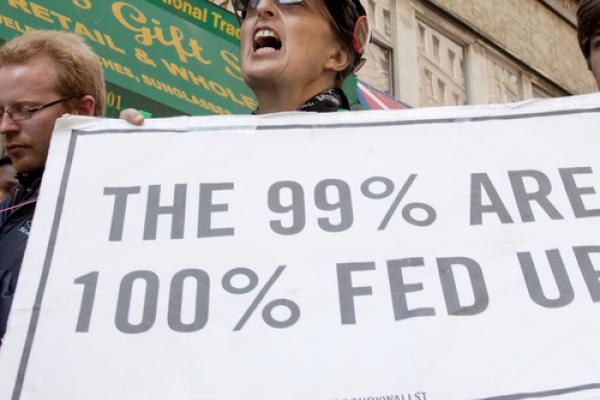Several days ago a document, the “GlobalMay Statement,” showed up in my email inbox. In the statement, it is explained that “this is an attempt by some inside the [occupy] movements to reconcile statements written and endorsed in the different assemblies around the world. The process of writing the statement was consensus based, open to all, and regularly announced on our international communications platforms, that are also open to all. It was a hard and long process, full of compromises. This statement is offered to people’s assemblies around the world for discussions, revisions and endorsements.”
One of the things which struck me was how strong the statement is on the climate and environmental crises. The first sentence of the first general point says that, “The economy must be put to the service of people’s welfare, and to support and serve the environment, not private profit.” Four of the ten bullet points under that first general point deal in some way with environmental issues.
This was striking given the serious weaknesses in this area as far as Occupy Wall Street’s first overall statement of what it was calling for last fall. In that document, released on September 30th, there were two sentences about a monopolized, poisoned and cruel-to-animals food system and a sentence about the 1 percent “continuing to block alternate forms of energy to keep us dependent on oil.” That was it.
It is good to see this positive evolution of the international “global spring/Occupy/Take the Square” movements, and to see, once again, the positive impact on the movement in the U.S. that comes from international connections. Another recent example is the way in which the international World Social Forum movement, begun a decade ago, stimulated and inspired what has become an important U.S. Social Forum movement over the past five-six years.
The overall content of the GlobalMay Statement is sound. It puts forward a vision of the future for the world very different than what we are getting from the vast majority of the old established political parties of all ideologies worldwide.
The statement, however, puts forward in a couple of sentences a perspective on strategy to get us to a different world that I have problems with: “We do not make demands from governments, corporations or parliament members, which some of us see as illegitimate, unaccountable or corrupt. We speak to the people of the world, both inside and outside our movements.”
I appreciate the up-from-the-bottom, build-popular-alternatives, anarchist-influenced sentiment behind this perspective. But if this becomes a rigid approach, it will unquestionably limit the reach, impact and possibilities for this movement.
For years I’ve believed that there are three essential components if we, the people are to have a decent chance of taking power away from the 1 percent--which we absolutely must do if we are to ever have a political and economic system that is truly democratic and just. Those three components are:
- thousands and thousands of grassroots based organizations in communities and at workplaces defending our rights, livelihoods and natural and work environments, and helping grassroots people develop their consciousness, skills and commitment to work together for fundamental change;
- a direct action, in-the-streets, popular movement which, through its visible, demonstrative actions, plays a key role in putting the 1 percent on the defensive and empowering the 99 percent (or a solid majority of it); and,
- an electoral vehicle, independent of the political and economic forces which dominate both the Republican and Democratic parties, which can attract current office holders, elect solid progressives to office at all levels, and present a coherent, platform-based alternative to the parties of the 1 percent.
Without all three of these forms of organizing and action, we have little chance of accumulating the political momentum and power to overcome the systems of oppression, repression and environmental devastation.
The electoral question in the US continues to be a huge conundrum, primarily because of the corporate-dominated, two-party undemocratic, winner-take-all nature of our electoral system. These realities make it very difficult for electoral-oriented, progressive political parties to survive, much less thrive.
This is why I’m convinced that what we need as far as an overarching electoral vehicle is not a third party but a third force within which Greens and other progressive third parties would play an active role, along with progressive Democrats, other independents and probably some grassroots Republicans.
During this Presidential election year, shouldn’t we be debating these critical strategic questions?
Ted Glick has been an activist and organizer since 1968 who has focused on the climate issue since 2004. Past writings and other information can be found at http://tedglick.com, and he can be followed on twitter at @TGlick.
Photo: 99 percent demonstration on May Day. Glynnis Jones / Shutterstock.com
Got something to say about what you're reading? We value your feedback!
